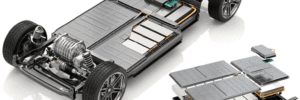Are you testing EV battery modules and packs strategically? The increased growth of the EV industry is driving the race to get quality EV components and systems to market fast. Developing an appropriate EV battery test plan is crucial for reducing test time, enhancing test coverage, and shortening your path to market. Testing without the right tools can delay projects, increase safety risks, and hinder productivity.
Testing EV battery modules and packs involve more than just battery cycling. A battery test system needs to have the right hardware and software for test development, BMS communication, integration with other devices, and data analytics. A battery cycler with a flexible platform allows you to move seamlessly from R&D testing to pilot production, and into large scale manufacturing. Open and customizable software is equally important to optimize test automation, increase lab efficiency, and leverage battery insights. Without a long-term test strategy, you might inadvertently select fixed solutions that don’t evolve with your future test requirements.
In this webinar at our Spring Virtual Conference on EV Engineering, presented by NH Research, we’ll cover:
• Industry trends impacting battery test
• How to develop an EV battery test plan and reduce time to market
• Key differences between flexible vs. fixed solutions
• Battery test software development strategies and lab optimization
• Next generation battery test solutions
Other sessions at our Spring Virtual Conference include:
Reduce Battery Dry Room CO₂ Footprint Up To 95%
In this presentation, we will explore how a battery dry room can be optimized with a focus on the adsorption dehumidifier.
Dehumidifiers in Li-ion battery dry rooms use a lot of energy, up to 43% of total energy consumption in the battery manufacturing process, to keep the dry rooms super dry—that’s a relative humidity of under 1% and dew points ranging from -40°C to -120°C.
Rasmus Toftegaard will explain how Cotes adsorption dehumidifiers work, how it benefits manufacturers and how it is possible to achieve massive energy reductions, cost savings, and huge CO₂ emissions reductions.
Register here to learn more—it’s free!
See the full sessions list for the Spring Virtual Conference on EV Engineering here.
Broadcast live April 4 – 7, 2022, the conference content will span the EV engineering supply chain and ecosystem including motor and power electronics design and manufacturing, cell development, battery systems, testing, powertrains, thermal management, circuit protection, wire and cable, EMI/EMC and more.
Source: Charged EVs
